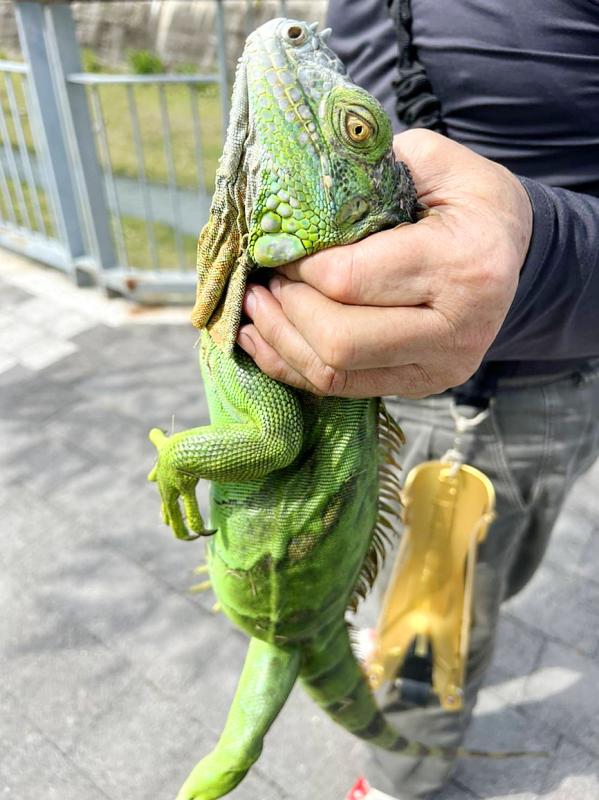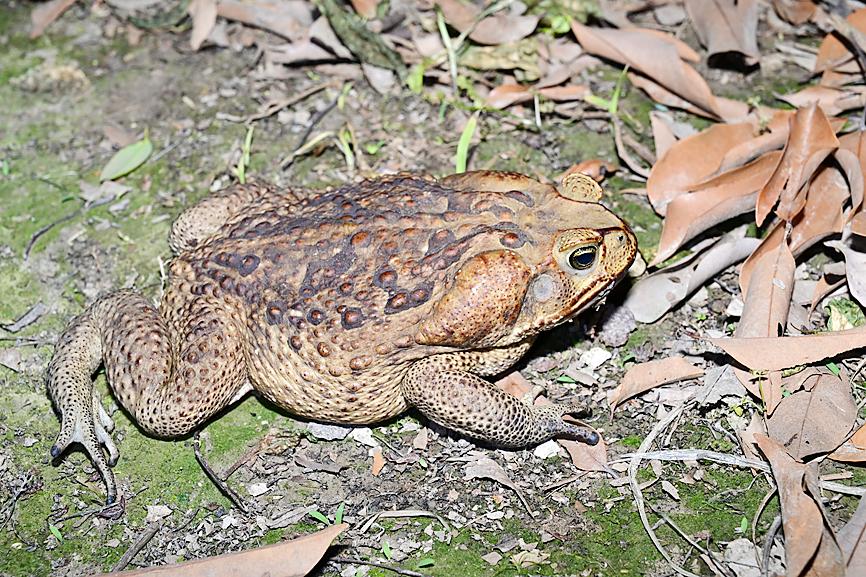The Forestry Bureau on Saturday reminded the public that possession of an African sacred ibis, a green iguana or a cane toad without a permit is punishable with a fine of up to NT$50,000 and confiscation of the animal.
The Council of Agriculture (COA) on April 4 unveiled a pet management division, while also drawing up a list of inappropriate species to import, bureau Conservation Division Director Lo Yu-chuan (羅尤娟) said.
The African sacred ibis, green iguana and cane toad are among the species designated as harmful invasive species, which means permits are needed to breed or own them, she said.

Photo courtesy of the Forestry Bureau
People who own a pet on the blacklist must register it before being allowed to keep it under an exemption clause in the regulation, while breeding can only take place after a permit is issued, she said.
Foreign species are hard to remove once they escape into the wild and methods of intervention — including sabotaging nests, trapping and hunting — are expensive, labor-intensive and time-consuming, she said.
The effective containment and eradication of invasive species relies on early detection and the ability to adjust plans “on the fly,” Lo said.

Photo courtesy of a member of the public
Green iguanas — which can grow up to 1m long — are harmful because they dig holes into embankments and fishponds, eat fruits and vegetables on farms, and have no natural predators in Taiwan, the division said.
Cane toads have venom that they spray at perceived threats, which can cause severe irritation to humans and death to animals, it said.
The poison gives the cane toad a natural advantage, and they pose an immense threat to indigenous frogs and toads, it said, adding that the toad is carnivorous, which worsens its environmental impact.

Photo courtesy of Yang Yi-ju
The African sacred ibis uses the same habitats and food sources as indigenous herons, leading to competition, it said, adding that the large ibis damages paddies as it hunts for food.
The ibis also breaks off the top branches of trees when it nests, which damages Taiwan’s vegetation, it said.
Green iguanas and cane toads came into the country as pets, while African sacred ibises were imported by a private zoo, it said.
The species are a priority in the bureau’s ongoing efforts to eradicate invasive species in Taiwan, a council official said.
Since 2019, 17,690 African sacred ibises, 55,416 green iguanas and 1,400 cane toads have been removed from the wild, the bureau said, adding that the campaign against the toads began shortly after their discovery in Nantou County’s Caotun Township (草屯).
These operations have cost about NT$100 million (US$3.43 million), it added.
Environment and Animal Society of Taiwan deputy director Chen Yu-min (陳玉敏) said the government should establish a protocol for the humane removal and euthanasia of the species.
Humans must be strictly prohibited from consuming these animals to prevent the spread of diseases, she added.

EVA Air is prohibiting the use of portable chargers on board all flights starting from Saturday, while China Airlines is advising passengers not to use them, following the lead of South Korean airlines. Current regulations prohibit portable chargers and lithium batteries from check-in luggage and require them to be properly packed in carry-on baggage, EVA Air said. To improve onboard safety, portable chargers and spare lithium batteries would be prohibited from use on all fights starting on Saturday, it said. Passengers are advised to fully charge electronic devices before boarding and use the AC and USB charging outlets at their seat, it said. South

Hong Kong-based American singer-songwriter Khalil Fong (方大同) has passed away at the age of 41, Fong’s record label confirmed yesterday. “With unwavering optimism in the face of a relentless illness for five years, Khalil Fong gently and gracefully bid farewell to this world on the morning of February 21, 2025, stepping into the next realm of existence to carry forward his purpose and dreams,” Fu Music wrote on the company’s official Facebook page. “The music and graphic novels he gifted to the world remain an eternal testament to his luminous spirit, a timeless treasure for generations to come,” it said. Although Fong’s

WAR SIMULATION: The developers of the board game ‘2045’ consulted experts and analysts, and made maps based on real-life Chinese People’s Liberation Army exercises To stop invading Chinese forces seizing Taiwan, board gamer Ruth Zhong chooses the nuclear option: Dropping an atomic bomb on Taipei to secure the nation’s freedom and her victory. The Taiwanese board game 2045 is a zero-sum contest of military strategy and individual self-interest that puts players on the front lines of a simulated Chinese attack. Their battlefield game tactics would determine the theoretical future of Taiwan, which in the real world faces the constant threat of a Chinese invasion. “The most interesting part of this game is that you have to make continuous decisions based on the evolving situation,

China’s military buildup in the southern portion of the first island chain poses a serious threat to Taiwan’s liquefied natural gas (LNG) supply, a defense analyst warned. Writing in a bulletin on the National Defense and Security Research’s Web site on Thursday, Huang Tsung-ting (黃宗鼎) said that China might choke off Taiwan’s energy supply without it. Beginning last year, China entrenched its position in the southern region of the first island chain, often with Russia’s active support, he said. In May of the same year, a Chinese People’s Liberation Army Navy (PLAN) force consisting of a Type 054A destroyer, Type 055 destroyer,